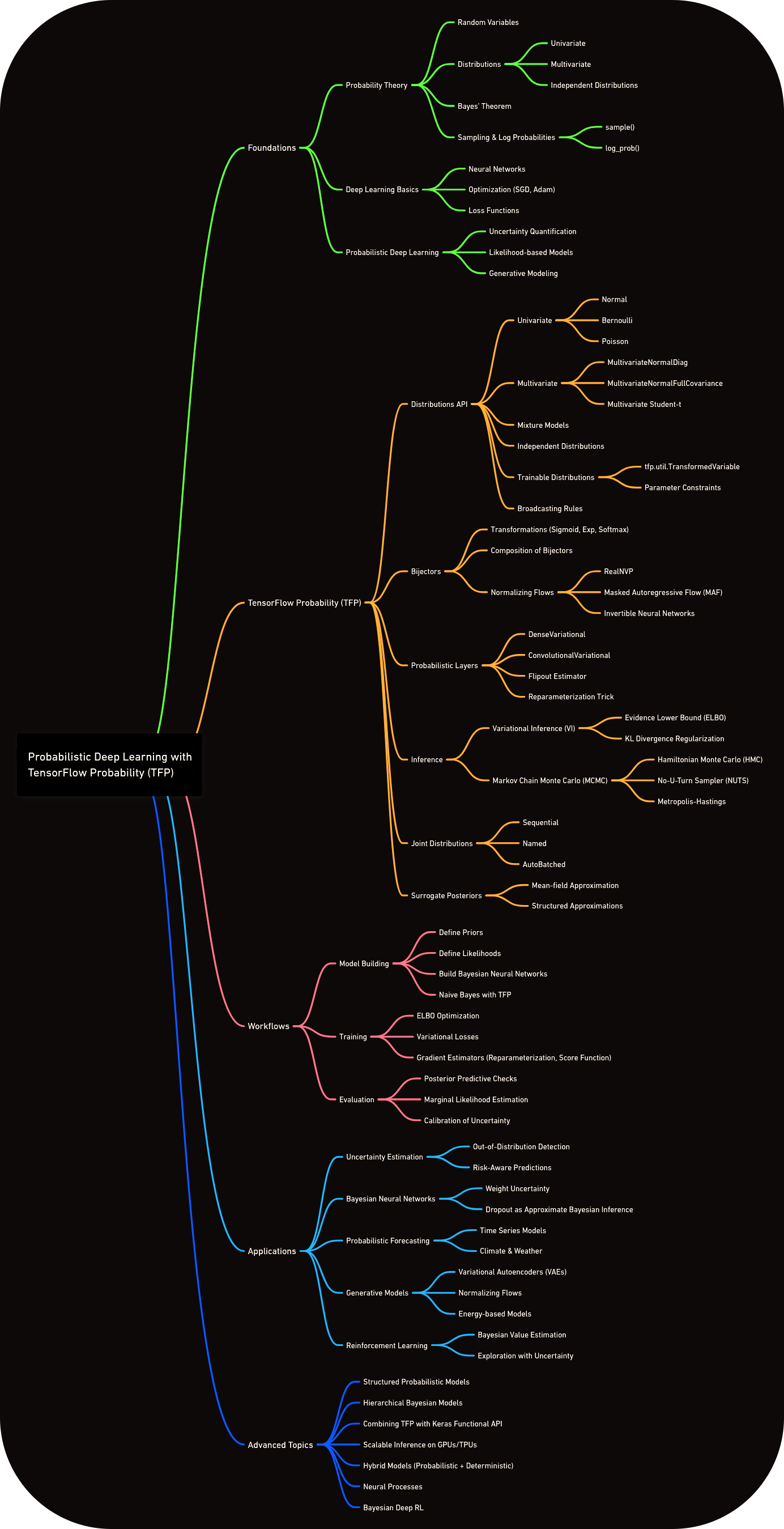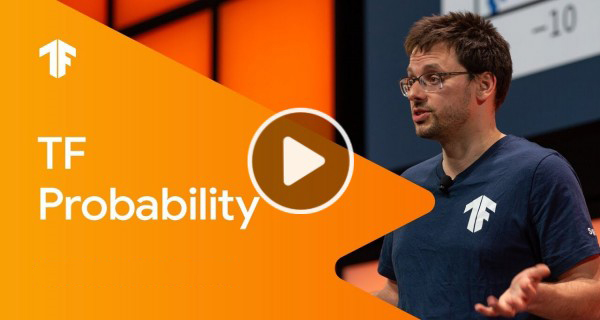https://github.com/mohd-faizy/probabilistic-deep-learning-with-tensorflow
Probabilistic Deep Learning finds its application in autonomous vehicles and medical diagnoses. This is an increasingly important area of deep learning that aims to quantify the noise and uncertainty that is often present in real-world datasets.
https://github.com/mohd-faizy/probabilistic-deep-learning-with-tensorflow
bernoulli-distribution binomial-distributions deep-probabilistic-models keras machine-learning multivariate-distributions poisson-distribution probabilistic-deep-learning probabilistic-layers probabilistic-programming tensorflow tensorflow-probability tensorflow2 tfp univariate-distributions
Last synced: 2 months ago
JSON representation
Probabilistic Deep Learning finds its application in autonomous vehicles and medical diagnoses. This is an increasingly important area of deep learning that aims to quantify the noise and uncertainty that is often present in real-world datasets.
- Host: GitHub
- URL: https://github.com/mohd-faizy/probabilistic-deep-learning-with-tensorflow
- Owner: mohd-faizy
- License: mit
- Created: 2020-11-17T18:38:39.000Z (about 5 years ago)
- Default Branch: main
- Last Pushed: 2025-09-12T21:08:10.000Z (3 months ago)
- Last Synced: 2025-09-12T22:41:56.728Z (3 months ago)
- Topics: bernoulli-distribution, binomial-distributions, deep-probabilistic-models, keras, machine-learning, multivariate-distributions, poisson-distribution, probabilistic-deep-learning, probabilistic-layers, probabilistic-programming, tensorflow, tensorflow-probability, tensorflow2, tfp, univariate-distributions
- Language: Jupyter Notebook
- Homepage:
- Size: 77.4 MB
- Stars: 70
- Watchers: 2
- Forks: 34
- Open Issues: 0
-
Metadata Files:
- Readme: README.md
- License: LICENSE
Awesome Lists containing this project
README
# 🧠 **Probabilistic Deep Learning with TensorFlow**
[](https://github.com/mohd-faizy)
[](https://tensorflow.org/)
[](https://www.tensorflow.org/probability)
[](https://jupyter.org/)
[](https://github.com/mohd-faizy/Probabilistic-Deep-Learning-with-TensorFlow)
[](https://github.com/mohd-faizy/Probabilistic-Deep-Learning-with-TensorFlow)
[](https://github.com/mohd-faizy/07T_Probabilistic-Deep-Learning-with-TensorFlow/issues)
[](https://github.com/mohd-faizy/Probabilistic-Deep-Learning-with-TensorFlow)
[](https://github.com/mohd-faizy/Probabilistic-Deep-Learning-with-TensorFlow/blob/master/LICENSE)
[](https://github.com/mohd-faizy/07T_Probabilistic-Deep-Learning-with-TensorFlow)
[](https://github.com/mohd-faizy/Probabilistic-Deep-Learning-with-TensorFlow)

This repository is a comprehensive collection of **TensorFlow Probability** implementations for probabilistic deep learning. The *primary* goal is **educational**: to bridge the gap between traditional deterministic models and real-world uncertainty quantification.
✨**Unlock the power of uncertainty quantification in machine learning.**
This repository provides hands-on implementations of probabilistic deep learning using TensorFlow Probability (TFP), enabling you to build models that not only make predictions but also quantify how confident they are about those predictions.
> **Documentation**: [TFP API Docs](https://www.tensorflow.org/probability/api_docs/python/tfp)
## 🎯 Overview

### What Makes This Repository Special?
Traditional machine learning models provide point estimates without quantifying uncertainty. In critical applications like medical diagnosis, autonomous vehicles, or financial modeling, **knowing how confident your model is** can be the difference between success and catastrophic failure.
- Enables models to express confidence levels using probabilistic layers and Bayesian neural networks.
- Supports sampling, log-likelihood evaluation, and manipulation of complex distributions (univariate & multivariate).
- Powers VAEs and normalizing flows for density estimation, representation learning, and synthetic data generation.
This repository demonstrates how **TensorFlow Probability** transforms your standard neural networks into probabilistic powerhouses that:
- **Quantify uncertainty** in predictions
- **Model complex distributions** beyond simple Gaussian assumptions
- **Perform Bayesian inference** at scale
- **Generate realistic synthetic data** through advanced generative models
### Why Probabilistic Deep Learning Matters
Real-world data is messy, incomplete, and uncertain. Probabilistic deep learning addresses these challenges by:
- **Handling Data Scarcity**: Bayesian approaches work well with limited data.
- **Robust Decision Making**: Uncertainty estimates guide better decisions.
- **Interpretable AI**: Understanding model confidence builds trust
- **Anomaly Detection**: Identifying outliers and unusual patterns.
- **Risk Assessment**: Quantifying potential failure modes.
#### ⚙️**Technical Strengths**
- Bayesian neural networks: Adds priors to weights and calibrates predictive uncertainty for out-of-distribution robustness.
- Normalizing flows: Uses invertible transforms for expressive density estimation and efficient sampling.
- Variational inference: Optimizes ELBO with reparameterization for controllable generation and learning.
#### 🚀**Trade-offs & Performance**
- Higher memory and training time than deterministic models.
- Gains in interpretability, calibrated risk, and anomaly detection often outweigh the cost
---
## 🔧 Prerequisites
### Mathematical Background
- **Linear Algebra**: Matrix operations, eigenvalues, SVD
- **Calculus**: Derivatives, gradients, optimization
- **Statistics**: Probability theory, Bayes' theorem, distributions
- **Information Theory**: KL divergence, entropy, mutual information
### Programming Skills
- **Python 3.8+** with object-oriented programming
- **TensorFlow/Keras** fundamentals
- **NumPy/SciPy** for numerical computing
- **Matplotlib/Seaborn** for visualization
### Recommended Reading
- [Pattern Recognition and Machine Learning](https://www.microsoft.com/en-us/research/people/cmbishop/#!prml-book) by Christopher Bishop
- [The Elements of Statistical Learning](https://web.stanford.edu/~hastie/ElemStatLearn/) by Hastie, Tibshirani, and Friedman
- [Probabilistic Machine Learning](https://probml.github.io/pml-book/) by Kevin Murphy
---
## 🚀 Quick Start
1. **Clone the repository:**
```bash
git clone https://github.com/mohd-faizy/Probabilistic-Deep-Learning-with-TensorFlow.git
cd Probabilistic-Deep-Learning-with-TensorFlow
```
2. **Create virtual environment (using [uv](https://github.com/astral-sh/uv) – ⚡ faster alternative):**
```bash
# Install uv if not already installed
pip install uv
# Create and activate virtual environment
uv venv
# Activate the env
source .venv/bin/activate # Linux/macOS
.venv\Scripts\activate # Windows
```
3. **Install dependencies:**
```bash
uv add -r requirements.txt
```
4. **Verify installation:**
```python
import tensorflow as tf
import tensorflow_probability as tfp
print(f"TensorFlow: {tf.__version__}")
print(f"TensorFlow Probability: {tfp.__version__}")
```
---
### ⚡ Quick Example
```python
import tensorflow as tf
import tensorflow_probability as tfp
tfd = tfp.distributions
# Create a probabilistic model
def create_bayesian_model():
model = tf.keras.Sequential([
tfp.layers.DenseVariational(
units=64,
make_prior_fn=lambda: tfd.Normal(0., 1.),
make_posterior_fn=tfp.layers.default_mean_field_normal_fn(),
kl_weight=1/50000
),
tf.keras.layers.Dense(10, activation='softmax')
])
return model
# Train with uncertainty quantification
model = create_bayesian_model()
model.compile(optimizer='adam', loss='sparse_categorical_crossentropy')
```
---
## 🎲 Core Probability Distributions
Understanding these distributions is crucial for effective probabilistic modeling:
---
### 📊 Discrete Distributions
#### **Binomial Distribution**
Models the number of successes in \(n\) independent trials with probability \(p\).
$$
P(X = k) = \binom{n}{k} p^k (1-p)^{n-k}
$$
**Use Cases**: A/B testing, quality control, medical trials
---
#### **Poisson Distribution**
Models the number of events occurring in a fixed interval.
$$
P(X = k) = \frac{\lambda^k e^{-\lambda}}{k!}
$$
**Use Cases**: Customer arrivals, system failures, web traffic
---
### 📈 Continuous Distributions
#### **Gaussian (Normal) Distribution**
The cornerstone of probabilistic modeling with symmetric, bell-shaped curves.
$$
f(x) = \frac{1}{\sigma\sqrt{2\pi}} \exp\left(-\frac{(x-\mu)^2}{2\sigma^2}\right)
$$
**Use Cases**: Neural network weights, measurement errors, natural phenomena
---
#### **Exponential Distribution**
Models waiting times and survival analysis.
$$
f(x) = \lambda e^{-\lambda x}, \quad x \geq 0
$$
**Use Cases**: System reliability, queueing theory, survival analysis
---
### 🌐 Multivariate Distributions
#### **Multivariate Gaussian**
Essential for modeling correlated variables with full covariance structure.
$$
f(\mathbf{x}) = \frac{1}{\sqrt{(2\pi)^k|\boldsymbol{\Sigma}|}}
\exp\left(-\frac{1}{2}(\mathbf{x}-\boldsymbol{\mu})^T\boldsymbol{\Sigma}^{-1}(\mathbf{x}-\boldsymbol{\mu})\right)
$$
**Use Cases**: Dimensionality reduction, portfolio optimization, computer vision
---
## 🧪 Hands-On Examples
### Comprehensive Notebook Collection
| # | Topic | Difficulty | Key Concepts | Notebook |
|---|-------|------------|--------------|----------|
| 00 | Univariate Distributions | 🟢 Beginner | Normal, Exponential, Beta distributions | [](01_The%20TensorFlow_Probability_library/00_Univariate_Distributions.ipynb) |
| 01 | Multivariate Distributions | 🟡 Intermediate | MultivariateNormal, covariance structure | [](01_The%20TensorFlow_Probability_library/01_MultiVariate_Distributions.ipynb) |
| 02 | Independent Distributions | 🟡 Intermediate | tfd.Independent, batch dimensions | [](01_The%20TensorFlow_Probability_library/02_Independent_Distributions.ipynb) |
| 03 | Sampling & Log Probabilities | 🟡 Intermediate | sample(), log_prob(), Monte Carlo | [](01_The%20TensorFlow_Probability_library/03_Sampling%20and%20Log%20Probabilities.ipynb) |
| 04 | Trainable Distributions | 🟡 Intermediate | tf.Variable parameters, gradient flow | [](01_The%20TensorFlow_Probability_library/04_Trainable_Distributions.ipynb) |
| 05 | TFP Distributions Summary | 🟢 Reference | Distribution catalog, API reference | [](01_The%20TensorFlow_Probability_library/05_tfp_Distributions_Summary_.ipynb) |
| 06 | Independent Naive Classifier | 🟡 Intermediate | Feature independence, text classification | [](01_The%20TensorFlow_Probability_library/06_Independent_dist_Naive_Clasif.ipynb) |
| 07 | Naive Bayes with TFP | 🟡 Intermediate | Bayes' theorem, posterior computation | [](01_The%20TensorFlow_Probability_library/07_Naive_Bayes_Classif_with_TFP.ipynb) |
| 08 | Multivariate Gaussian Full Covariance | 🔴 Advanced | Full covariance, correlation modeling | [](01_The%20TensorFlow_Probability_library/08_Multivariate_Gaussian_with_full_covariance.ipynb) |
| 09 | Broadcasting Rules | 🟡 Intermediate | Shape manipulation, batch processing | [](01_The%20TensorFlow_Probability_library/09_Broadcasting_rules.ipynb) |
| 10 | Naive Bayes & Logistic Regression | 🟡 Intermediate | Generative vs discriminative models | [](01_The%20TensorFlow_Probability_library/10_Naive_Bayes_%26_logistic_regression.ipynb) |
| 11 | Probabilistic Layers & Bayesian NNs | 🔴 Advanced | DenseVariational, weight uncertainty | [](02_Probabilistic_layers_and_Bayesian_Neural_Networks/Probabilistic_layers_and_Bayesian_Neural_Networks.ipynb) |
| 12 | Bijectors & Normalizing Flows | 🔴 Advanced | tfp.bijectors, invertible transforms | [](03_Bijectors_and_Normalising_Flows/Bijectors_and_Normalising_Flows.ipynb) |
| 13 | Variational Autoencoders | 🔴 Advanced | ELBO, reparameterization trick | [](04_Variational_Autoencoders/Variational_Autoencoders.ipynb) |
| 14 | Probabilistic Generative Models | 🔴 Expert | Complete pipeline, model evaluation | [](05_Capstone_Project/Probabilistic_generative_models.ipynb) |
---
## 📊 Performance Benchmarks
### Training Time Comparison
| Model Type | Dataset | Standard NN | Bayesian NN | VAE | Normalizing Flow |
|------------|---------|-------------|-------------|-----|------------------|
| MNIST Classification | 60k samples | 2 min | 8 min | 12 min | 15 min |
| CIFAR-10 Classification | 50k samples | 15 min | 45 min | 60 min | 90 min |
| CelebA Generation | 200k samples | N/A | N/A | 120 min | 180 min |
>*Benchmarks on NVIDIA RTX 3080 GPU*
### Memory Usage
Probabilistic models typically require **2-4x more memory** than standard models due to:
- Parameter uncertainty representation
- Additional forward/backward passes
- Sampling operations during training
---
## 🎯 TensorFlow Probability vs TensorFlow Core
| **Aspect** | **TensorFlow Probability (TFP)** | **TensorFlow Core (TF)** |
|------------|-----------------------------------|--------------------------|
| **Primary Focus** | Probabilistic modeling, uncertainty quantification | Deterministic neural networks, optimization |
| **Model Output** | Distributions with uncertainty bounds | Point estimates |
| **Key Strengths** | Bayesian inference, generative modeling | Fast training, established workflows |
| **Learning Curve** | Steeper (requires probability theory) | Gentler (standard ML concepts) |
| **Memory Usage** | Higher (parameter distributions) | Lower (point parameters) |
| **Training Time** | Slower (sampling, variational inference) | Faster (direct optimization) |
| **Interpretability** | Higher (uncertainty quantification) | Lower (black box predictions) |
| **Best Use Cases** | Critical decisions, small data, research | Large datasets, production systems |
---
## 🤝 Contributing
We welcome contributions from the community! Here's how you can help:
### Contribution Process
1. **Fork** the repository
2. **Create** a feature branch (`git checkout -b feature/amazing-feature`)
3. **Commit** your changes (`git commit -m 'Add amazing feature'`)
4. **Push** to the branch (`git push origin feature/amazing-feature`)
5. **Open** a Pull Request
---
## 🌟 Star History
[](https://star-history.com/#mohd-faizy/Probabilistic-Deep-Learning-with-TensorFlow&Date)
---
## 📚 Additional Resources
### Reference Materials
- [Probability Cheatsheet A](CheatSheet/01_Probability_Cheatsheet_a.pdf)
- [Probability Cheatsheet B](CheatSheet/02_Probability_Cheatsheet_b.pdf)
- [TensorFlow Probability Official Guide](https://www.tensorflow.org/probability)
### Research Papers
#### Foundational Papers
- [Auto-Encoding Variational Bayes](https://arxiv.org/abs/1312.6114) - Kingma & Welling (2013)
- [Stochastic Backpropagation and Approximate Inference in Deep Generative Models](https://arxiv.org/abs/1401.4082) - Rezende et al. (2014)
- [Weight Uncertainty in Neural Networks](https://arxiv.org/abs/1505.05424) - Blundell et al. (2015)
- [Variational Inference: A Review for Statisticians](https://arxiv.org/abs/1601.00670) - Blei et al. (2017)
- [Probabilistic Machine Learning and Artificial Intelligence](https://www.nature.com/articles/nature14541) - Ghahramani (2015)
#### Normalizing Flows & Bijectors
- [Normalizing Flows for Probabilistic Modeling and Inference](https://arxiv.org/abs/1912.02762) - Papamakarios et al. (2019)
- [Density estimation using Real NVP](https://arxiv.org/abs/1605.08803) - Dinh et al. (2016)
- [Glow: Generative Flow with Invertible 1x1 Convolutions](https://arxiv.org/abs/1807.03039) - Kingma & Dhariwal (2018)
#### Bayesian Neural Networks
- [Practical Variational Inference for Neural Networks](https://papers.nips.cc/paper/2011/hash/7eb3c8be3d411e8ebfab2f32016d5ee5-Abstract.html) - Graves (2011)
- [What Uncertainties Do We Need in Bayesian Deep Learning for Computer Vision?](https://arxiv.org/abs/1703.04977) - Kendall & Gal (2017)
- [Simple and Scalable Predictive Uncertainty Estimation using Deep Ensembles](https://arxiv.org/abs/1612.01474) - Lakshminarayanan et al. (2017)
#### Variational Inference & MCMC
- [Black Box Variational Inference](https://arxiv.org/abs/1401.0118) - Ranganath et al. (2014)
- [Automatic Differentiation Variational Inference](https://arxiv.org/abs/1603.00788) - Kucukelbir et al. (2017)
- [The No-U-Turn Sampler: Adaptively Setting Path Lengths in Hamiltonian Monte Carlo](https://arxiv.org/abs/1111.4246) - Hoffman & Gelman (2014)
#### TensorFlow Probability Specific
- [TensorFlow Distributions](https://arxiv.org/abs/1711.10604) - Dillon et al. (2017)
- [Probabilistic Programming and Bayesian Methods for Hackers](https://github.com/CamDavidsonPilon/Probabilistic-Programming-and-Bayesian-Methods-for-Hackers) - Davidson-Pilon (2015)
#### Applications & Case Studies
- [Leveraging Heteroscedastic Aleatoric Uncertainties for Robust Real-Time LiDAR 3D Object Detection](https://arxiv.org/abs/2002.05796) - Chang et al. (2020)
- [Predictive Uncertainty Estimation via Prior Networks](https://arxiv.org/abs/1909.00218) - Malinin & Gales (2018)
---
## ⚖️ License
This project is licensed under the MIT License - see the [LICENSE](LICENSE) file for details
---
## 🔗 Connect with me
[](https://twitter.com/F4izy)
[](https://www.linkedin.com/in/mohd-faizy/)
[](https://ai.stackexchange.com/users/36737/faizy)
[](https://github.com/mohd-faizy)
